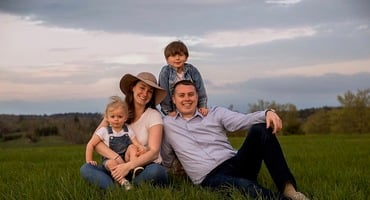Find all posts in this 8-part Berkshire Chanukah series HERE.
Want to stay on top of all the latest and greatest happenings for families in the Berkshires? Sign up to receive your free weekly newsletter HERE.
Over two thousand years ago, during the time of the Second Temple, the part of the world we now call “Israel” was ruled by a man named Antiochus and the Greek empire. Antiochus had a hard time understanding the Jewish people and their traditions, and this frustrated him. Instead of asking questions to learn about Judaism, Antiochus told the Jews that they could not practice their religion in his land. No longer could they relax during Shabbat, read from the Torah, or even go to temple.
The Jewish people were so proud of their Temple in Jerusalem. At this temple there were important things Jews needed to practice their religion — it held the Torah, the book that told the story of the Jewish people and the menorah, an oil lamp with seven branches. Six of these branches represent each day of the regular week. The branch that is higher than the others is for Shabbat, the day of rest that happens between sundown on Friday and sundown on Saturday when Jews take a break from work and school to hang out with each other.
Antiochus wanted everyone to be Greek. He put up statues of Greek Gods in the Temple, replaced the Torah with books written by Greeks, forced Jews to work on Shabbat, and even made Jewish traditions like weddings and prayer illegal! But the Jewish people would not abandon their religion. One man named Judah Maccabee and his children decided to fight back against the unfair rules, and as soon as they did other people wanted to help too. For years the Maccabees pushed back and eventually drove the Greek army out of their land entirely. Judah Maccabee and his army beat the massive Greek army and Jews all over could go back to studying Torah and keeping Shabbat.
Celebration and the miracle of the oil
When the Jews were celebrating this victory they went back to the Temple and what they saw made them very sad. Besides the idols set up all over the building, the Greeks had also filled the space with mud and dirt and garbage so that nobody would want to use it. The menorah was dirty and a little broken, but it still worked. To light the menorah, a special type of oil had to be used. As the Jews got to work cleaning up the temple, they found a tiny amount of this special oil. They didn’t think the menorah would stay lit for more than a day, but they used this oil anyway and started making more oil which they knew would take over a week to do. Eight days later, when more oil was ready, they were so surprised that the light of the menorah was still burning from before!
Jews say “Happy Chanukah” and eat fried foods like potato latkes and sufganyot(jelly donuts). We give gifts to our friends and play with the dreidel, a game piece that has Hebrew letters saying “a great miracle happened there” to remember how lucky we are that the Maccabees fought for us to be Jewish today.
Happy Chanukah from your friends at Hevreh of Southern Berkshire!
********************
Jodie Friedman is the Program Associate at Hevreh of Southern Berkshire in Great Barrington. Hevreh of Southern Berkshire is a destination for Jewish Life, Learning, and Community in the southern Berkshires. The Hebrew word "Hevreh" means friendship — a word that states Hevreh of Southern Berkshire's purpose — to be a community of friends in a Jewish context.


